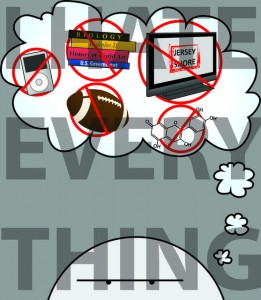I am an entertainment news aficionado. Not the TMZ or E! celebrity kind, but the articles written with less neutrality and more personal charm, caustic humor, opinion, and profanity that seem to be aimed at a younger audience of newsreaders. Sometimes they’re about serious, newsworthy topics like this article from Vice on the anniversary of the Iraq War. Sometimes they’re about absolutely nothing of relevance like this Gawker story about a new McDonald’s menu item. Relevant or not, it’s hard for me to pass up an article with a sense of humor that can simultaneously inform me while making me crack a smile.
Esteemed journalists may roll their eyes at such blatant disregard for basic journalistic principles like objectivity or, you know, not dropping an “F” bomb, but as long as the facts are straight or clearly falsified for satirical purposes I see no harm. If it takes a little sarcasm and swearing to get my attention-deficit generation to read up on foreign policy or the economy, then I’m willing to blur the lines of true reporting for a more-informed youth.
With my feelings for this evolving form of storytelling made clear, I will say that I do not think that the blog-esque, sassier style of telling the news replaces traditional journalism. Presenting the facts without spin or added fluff and choosing subjects that matter instead of simply spewing out whatever stuff our meme-addicted, social media-brainwashed young adults seem to be asking for is vital for perpetuating a socially aware, intelligent upcoming generation.
While perusing the news sites I frequent, I’ve been seeing an increase of content that makes me question whether reputable news outlets are starting to sacrifice what’s important for what’s going to get them readership.
For example, the homepage of CNN features front and center a section of videos and stories with titles such as “Miley Cyrus twerks in a unicorn onesie,” “Remembering Mike the headless chicken,” and “Do sexy flight attendants really sell more seats?” I understand that even a news outlet as respected as CNN has to have a balance of the serious and the silly because human interest stories draw readers in for the hard-hitting pieces that the public needs to know. However, I feel like such prime real estate as the center of the homepage could be better allotted to something of more importance than a possible link between attractive flight attendants and ticket sales.
Another site with stories getting frequent shares on my Facebook feed is BuzzFeed. Although this site makes no claims to be a source of news and is obviously intended for entertainment, it does offer more meaty sections like politics and LGBT among its less-pressing ones such as Food and Celeb. However, it seems to favor pieces about cute animals, which I absolutely read and show my friends, over their more newsy pieces. There is a lot of informative content on the site; it’s just a little more work to access.
I get that sites like this have found their niche among baby animal-loving, celebrity-mocking, irrelevant fact-hoarding individuals, and I think those are all fine niches. How could I knock a site for providing “The 25 greatest sloths the Internet has ever seen” when I am one of the readers in awe over it?
I can’t, and I won’t.
With such a strong following among a critical audience, maybe BuzzFeed and similar sites can shake things up every once in a while and put up a few more newsworthy pieces and make sure those are front and center.
I’d just like to know that for every sloth picture someone ogles over or with each interest in Miley’s twerks, an article of substance gets its day in the sun, too.
Contact CU Independent Opinion Editor Lizzy Hernandez at Elizabeth.hernandez@colorado.edu.


